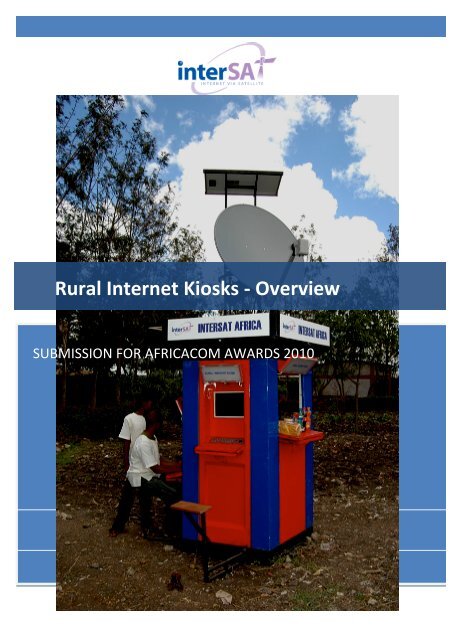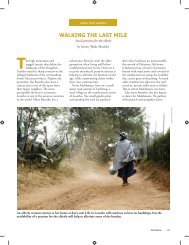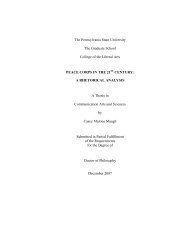Rural Internet Kiosks -â Overview - Africa Rural Connect
Rural Internet Kiosks -â Overview - Africa Rural Connect
Rural Internet Kiosks -â Overview - Africa Rural Connect
Create successful ePaper yourself
Turn your PDF publications into a flip-book with our unique Google optimized e-Paper software.
<strong>Rural</strong> <strong>Internet</strong> <strong>Kiosks</strong> -‐ <strong>Overview</strong> SUBMISSION FOR AFRICACOM AWARDS 2010
INTERSAT AFRICA LTD. Prepared by: Dennis Wambugu and Crystal Kigoni RIK Project Managers Tel: +254 20 5000555 ext 156 Cell: +254 722 790121 Email: sales@intersatafrica.com Intersat <strong>Africa</strong>’s Copyright The Contents herein are the copyright of Intersat <strong>Africa</strong> Limited and is issued in confidence only for the purpose for whichit is intended. It must not be reproduced, in whole or in part, or used for tendering or manufacturing purposes except underan agreement with the consent in writing of Intersat <strong>Africa</strong> Ltd, and then only on the condition that this note be included insuch reproduction.1.0Our Goal: To bridge the digital divide in<strong>Africa</strong> by providing a practical andsustainable platform to enable access to ICTin the remotest parts of <strong>Rural</strong> <strong>Africa</strong>.Through RIKs we aim to empower thecontinent’s rural masses with information tohelp in their daily lives such as Education,Healthcare, Farming, Telephony
EXECUTIVE OVERVIEW Information and communications technologies are changing the ways in which we are educated about the world. Sub Saharan <strong>Africa</strong> has long experienced challenges in delivering educational products and materials to the people. This lack of access to information resources is seen in the majority of educational institutions, and most is profoundly illustrated in the rural communities. The digital divide, which we define as, a lack of access to information within a specific population, is systematically hampering individual and collective development in <strong>Africa</strong>. This is symbolized by the significant gap between developed and developing countries opportunity to obtain and utilize information. The digital divide runs much deeper than hardware and software. The real heart of the digital divide is that those without access to information resources will lack the ability to be competitive in today’s globalized world. If sufficient economic resources in <strong>Africa</strong> are strategically invested in developing ICT capacities within educational facilities, the next generation of <strong>Africa</strong>n children will be better equipped to compete for prosperity worldwide. Diffusion of ICTs in <strong>Africa</strong> can empower rural youths with the resources necessary to generate income and manage small businesses. Unemployed youths can gain employment as community knowledge workers in the capacity of <strong>Rural</strong> <strong>Internet</strong> Kiosk (RIK) operators thereby serving as an asset to the development of the community at large. The <strong>Rural</strong> <strong>Internet</strong> Kiosk (RIK) is an independent self contained 100% solar powered kiosk featuring three industrial design computer terminals, a manned administrator terminal, and broadband wireless <strong>Internet</strong> connectivity. RIK has been designed to help bridge the digital divide in <strong>Africa</strong> and concentrates on connecting individuals in rural areas where a large percentage of the population has no access to existing ICT infrastructure. <strong>Africa</strong> has been plagued by the same obstacles in rural areas as can be found throughout Sub-‐Saharan <strong>Africa</strong>. Material poverty, poor health, low levels of sanitation, low levels of education, lack of access to government services, and lack of access to finance are among the core issues found in rural communities. These challenges can all be addressed through the provision of information and communications technologies. The <strong>Rural</strong> <strong>Internet</strong> <strong>Kiosks</strong> provide the following development solutions: E-‐agriculture; E-commerce; E-‐health; E-‐government; E-‐banking; E-‐learning; Relief services; Local content creation; Skills training; Employment opportunities; Independent local media; and Knowledge diffusion from the North to the South and from the South to the North.
E-‐learning is not effective without the proper implementation strategy and <strong>Internet</strong> access is critical in this process. The provision of equipment with only basic curriculum based materials and without access to international resources reinforces the digital divide by limiting learning and application potential. Online educational materials have been created for classroom use, teacher training, and continuing research. These resources are being utilized in classrooms throughout the world to add depth to the learner’s experience. This can easily be applied to the rural community population and is critical as the need for adult education is continually increasing. As the importance of high quality education is universally understood, this project looks at the key players in the community who provide support to student. The approach of this project is to provide the broadest access to the community for realizing maximum impact. This approach views the entirety of the community as stakeholders, while also seeking leadership from government led initiatives. By providing information and communications access to all stakeholders rather than focusing on one segment of the population, this project creates potential impact equally throughout the <strong>Africa</strong>n republic. By involving siblings, parents, and other community members, the youth will feel the support of the entire community in their learning process which is vital to technological acceptance. WHY RURAL INTERNET KIOSKS? The Ministries of Education in various <strong>Africa</strong>n countries have publically recognized the benefits of e-‐learning as demonstrated by the numerous newspaper articles published throughout <strong>Africa</strong> in the past few years. The <strong>Rural</strong> <strong>Internet</strong> Kiosk e-‐learning solution adequately meets the demands of the rural <strong>Africa</strong>n people. It provides the necessary technological prerequisites for deployment and connectivity in any location at an affordable cost. The Ministry of Youth has also shown significant interest in using ICT to create entrepreneurship among youths as evidenced by a recent training for local level ministry staff in cooperation with Microsoft. By deploying <strong>Rural</strong> <strong>Internet</strong> <strong>Kiosks</strong> in every one of the several remote territorial districts, the government will be providing information and communications to several thousands of citizens. In addition it also provides several times the number of Jobs to various citizens at the place and time of deployment. Citizens will have the ability to learn to access a limitless supply of resources online. Considering the high density of the population, each <strong>Rural</strong> <strong>Internet</strong> Kiosk will have a ready market for services allowing for a generous return on investment.
Infrastructure Challenges and Solutions There is a conviction and consensus on the potential of ICTs as tools for sustainable development particularly at the level of rural and local access. ICTs can be used in increasing access to healthcare, education, and business opportunities; they can help in decreasing vulnerabilities and improving citizen engagement with governments and their institutions. There has been a call for the promotion and adoption of a multi-‐sectoral approach in achieving universal, affordable and equitable access. According to the International Telecommunications Union, <strong>Africa</strong> has seen unprecedented growth in the ICT sector over the past 4 years surpassing South <strong>Africa</strong> for the number of mobile subscribers in 2009. The telecommunications sector has steadily grown more than 25% per year for the last 5 years. With this uptake of ICT the next logical step is universal internet connectivity beginning in educational facilities. Due to a lack of connectivity, the “developing world missed out on much of the excitement of the initial web revolution, the dotcom boom and Web 2.0, largely because it did not have an internet infrastructure. But developing countries may now be poised to leapfrog the industrialized world.” (Economist, 2008) There is no reason why <strong>Africa</strong> should struggle to follow the same path to development as the industrialized world. <strong>Africa</strong> can learn from the mistakes of the “developed” countries and leap ahead utilizing new green technologies that were unheard of 50 years ago. One such opportunity is solar energy. It is challenging without electricity to deploy computers and other information and communications technologies. Rather than stumbling over this hurdle and forgetting those in need, Intersat began testing different ICT hardware capable of running on solar energy. The typical desktop computer requires 210 Watts of electricity to operate. With its high energy consumption, a solar power solution is unfeasible as the cost would be exorbitant. Due to this factor we began testing a number of different low power solutions and have come up with a variety of new computing products that can run on less than 60 Watts. The decrease in power consumption created an increase in hardware costs. Thus the cost of the new technologies would have been out of reach for a majority of rural users. Rather than saying rural computing is not cost effective, we continued to search for solutions to the cost effectiveness quagmire. The answer is multi-computing.Infrastructure is essential for access: without it, people cannot use the services that networks make available. However, meaningful access – at the community or individual level – requires more than infrastructure. People also need the funds to afford access, the skills required to make use of services and equipment, and the availability of content which is of value to them.
Knowledge Development Facilitates Skills Development ICT can help create and sustain new opportunities for economic development. Accelerated knowledge transfer and technological diffusion amplify the competitive advantages of fast-evolving economies. As the information requirements for innovation in economic and social activities increase, the importance of ICT for the development agenda will continue to expand. The first step in knowledge development is for rural people to learn basic computer skills. Most of the computer training in rural areas focuses on what are referred to as the “7 basic packages” which is restricted to the Microsoft Office suite. While understanding these productivity tools is important, the learning ends before the <strong>Internet</strong> is reached. <strong>Rural</strong> <strong>Internet</strong> Kiosk operators can take online training courses in ICT4D, Social Business, Web 2.0, and Local content generation among others. Youth who have been through training will have access to additional online trainings in subject areas seldom considered as potential employment opportunities thereby broadening their horizons. The central point in the training is to empower the people to seek knowledge to find solutions for their local development issues and to create sustainable employment. ICT Skills and Enterprise The youth of <strong>Africa</strong> are the key drivers in reaching the internationally agreed upon objectives for the creation of the Information Society outlined in the World Summit on the Information Society (WSIS) Plan of Action and the Vision 20-‐2020. An article published on 28 th of May on the e<strong>Africa</strong> websites shows the immediate need for youth enterprise through ICT. “The e-‐<strong>Africa</strong> 2010 Conference was held in Abuja last week with the theme, National ICT4D: Implications for Vision 20-‐2020 at the Shehu Musa YarÁdua Centre in Abuja. By the time the two plenary sessions of the first day were concluded, it had become clear that the nation needed a lot of policies targeted at youths, urgently, if Vision 20-‐2020 is to be realized since they will be the drivers of the economy a few years hence.” iSustainable ICTs are an international agenda item as per the Millennium Declaration, the Monterrey Consensus and the Johannesburg Declaration and Plan of Implementation will require training in hardware, software, the <strong>Internet</strong>, business skills, and computer science. There are young people across the country who are willing and eager to take part in this Digital Age. What they lack is the opportunity. Opportunities such as education and capital for business development will lead <strong>Africa</strong> into the knowledge economy. If the roll out of <strong>Internet</strong> services is accompanied by low cost training and access, it will facilitate the educate
of the population. The central component missing from the field are ice-‐breaking technologies taught in a way that is easily understood. The <strong>Internet</strong> can be a tool for economic growth with particular emphasis on human capital development. Where there is human capital development, economic development is likely to follow. The benefits in terms of human and economic development will lead to business development. The Power of IT to help the low income population “In several major areas, IT can play a powerful role in bringing an end to poverty.” Some of the unique capabilities of new ITs for serving the world's poorest people are 1 : I. The new IT can help to integrate the poor in the process of globalization by expanding their markets through e-‐commerce. Properly applied, the new IT can largely eliminate middlemen who fail to add unique value, allowing people in the poorest countries to work directly with consumers (donors and investors) in the developed world and create international job opportunities through electronically enabled outsourcing. II.III.IV.The new IT can promote self-‐employment among the poor liberating them from reliance on corporate employment or government work programs. This unleashes untold potential in creativity, energy, and productivity. Armed with a cell phone and an <strong>Internet</strong> connection, a <strong>Africa</strong>n villager can launch an enterprise that serves customers in Lagos or Abuja, London, or New York, transcending the vagaries of local economic fluctuations and market conditions. The new IT can bring education, knowledge and skill training to the poor in a very friendly way. One huge barrier to economic advancement for those in developing countries has been the sheer difficulty, cost, and inconvenience of bringing teachers, consultants and other suppliers of outside expertise into remote villages that are separated from capital cities by mountains, rivers, jungles, deserts, or hundreds of kilometers of inadequate roads. There are many purposes the <strong>Internet</strong> serves in helping to eliminate barriers making it possible, for example, for dairy farmers in a remote region of Bangladesh or <strong>Africa</strong> to consult with an agricultural expert in Beijing or Chicago about the latest techniques for improving the health of cattle or increasing crop yields. The best aspect of the new IT is that it cannot be controlled by a single owner or authority. It is an empowering tool that enhances opportunity and brings all the world's knowledge to everyone's doorstep. 1 The following is lifted directly from:
Empirical research has shown that growth in broadband directly correlates to growth in Gross Domestic Product. One recent World Bank econometrics analysis of 120 countries, shows that for every 10 percentage point increase in broadband service penetration there is an 1.3 percentage point increase in economic growth. (Qiang 2009) The World Bank has noted in its ICT4D 2009 report that broadband has considerable economic impact at all levels: individual, firm, and community. Individuals increasingly use broadband to acquire knowledge and skills to increase their employment opportunities. Where broadband has been introduced in rural areas of developing countries, villagers and farmers have gained better access to crop market prices, training, and job opportunities. When the <strong>Internet</strong> is introduced to rural areas it creates employment potential and stems the rush of rural to urban migration. Providing opportunities for income generation on the ground has a much greater impact than cybercafes and secretarial services. As in the previous example of farmers increasing their incomes through attaining accurate crop prices and training they also have the ability to reduce their fertilizer and pesticide expenditures by applying sustainable agriculture techniques on the farm. Innovations such as intercropping and composting are disseminated from farm to farm producing high crop yields at low costs. With increasing revenues children of farmers are more likely to consider the occupation of their parents as rewarding and continue in the trade. Basic computer skills empower youth to become self employed within the ICT sector itself as computer technicians, website designers, and a host of other services. With increased rural connectivity the list of opportunities goes on and on: teachers, social entrepreneurs, tourism, and telecommuting all stand to benefit from such a project implementation.
Services Requirements at the <strong>Rural</strong> <strong>Internet</strong> Kiosk • <strong>Internet</strong> access: This is provided by Intersat <strong>Africa</strong>'s get2net service via Satellite • Provision of hardware and sooware • Computer maintenance and support • Training services • Data Collecpon • Networking and capacity building • Local Content Creapon • Local and naponal market integrapon • Project Management Benefits: • Educaponal opportunipes for the masses. • Spreading the wonder of the <strong>Internet</strong> finally reaches the people who need it most • Social and economic advancement of the users. • Provides opportunity for youth to become gainfully employed. • Youth become empowered to be leaders in their communipes. • Women have the ability to parpcipate without gender bias. • Children become aware of new technologies at an early age to propel their educapon into the Digital Age. • Informapon brought directly to the doorsteps of the end users to improve their lives. • Higher income generapon means more access to knowledge and berer standards of living. • Educapon for all members of <strong>Africa</strong>n Society. • <strong>Rural</strong> local content creapon. • Data collecpon on made easy and locally relevant. • Long term sustainable industry development.
INTERSAT’s CUSTOMERS & REFERENCES Intersat is a recognized industry leader in providing scalable, reliable and superior Satellite <strong>Internet</strong> service for over a decade. We have served several organizations and ISPs who are very satisfied with our services. Zain DRC, Zain Kenya, United Nations Development Program (UNDP), World Bank (through the Kenya ICT board), Raga SPRL, OFIS, etc., are just to name a few. All these customers have onward subscribers and users, whose satisfaction with our service is crucial to us. Intersat has the capacity, capability and the technical experience to serve demanding customers and maintain high QoS levels. Some of our high profile, and extremely satisfied, customers across <strong>Africa</strong>: “We are extremely pleased in our partnership with Intersat <strong>Africa</strong> which started with the installation ofKenya’s first private <strong>Internet</strong> Gateway in December 2004. Intersat’s innovative services are a major leap inconnecting remote areas and KDN intends to use this service to establish multiple remote Gateway locationsthroughout East <strong>Africa</strong>.” Kai Wulff, CEO, Kenya Data Networks (KDN)
Testimonials & Press releases:
Intersat wins $12M tender to supply 53 Universities in Kenya with <strong>Internet</strong> connectivity See below statement by Professor Meoli – Head of Kenya Educational Network Trust: From: Meoli Kashorda [mailto:mkashorda@kenet.or.ke] Sent: Tuesday, May 05, 2009 7:01 PM Dear Victor, Kai, Owino, Musili and Hanif, Thank you all for making time to attend the meeting convened by Victor Kyalo. I think it was a very fruitful meeting that will only strengthen our partnership. I think supplying the 214.552 Mb/s of 1:1 contention bandwidth immediately solved a huge problem for us especially with the PS Ndemo talking about broadband for universities. We in KENET certainly are indebted to Intersat <strong>Africa</strong> -‐ we just want to make sure that we can fully account for public resources we have been given and improve the learning environment of Kenyan universities. In sub-‐Sahara <strong>Africa</strong>, Kenya is the only country that has decided to support universities in this way, other countries just talk! Now that we have solved the most challenging technical and commercial problems, I want to congratulate Intersat and their partners on the ground on a job well-‐done. Thanks again Meoli Kashorda KENET/USIU i http://e<strong>Africa</strong>.com.ng/show_news.php?article=3851
















